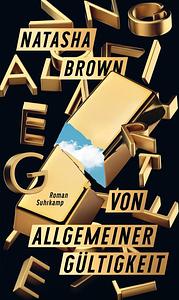You need to sign in or sign up before continuing.
Take a photo of a barcode or cover
challenging
funny
medium-paced
Plot or Character Driven:
A mix
Strong character development:
Complicated
Loveable characters:
Complicated
Universality by Natasha Brown is another short read from the booker longlist. It wasn’t one that initially appealed to me and I’d deprioritised it after seeing a lot of lukewarm reviews. But honestly? I really dug this one.
It’s blisteringly sharp, intelligent and witty. The tone and form felt exciting from the very first chapter, which opens as a long-form article chronicling the assault of a man at a covid lockdown-era farm rave. The bludgeon? A gold bar.
Now you might think this is a whodunit, but it’s very much not that. The rest of the chapters shift perspectives from the journalist who wrote the article, the wealthy banker who owns the farm (and ‘gold bar’), and Miriam ‘Lenny’ Leonard, an ‘equal-opportunity hater’ columnist linked to the whole thing.
I enjoyed the structure (which seems to be a sticking point for others from what I’ve read) but I liked how each chapter made you re-think what came before. This is a satire, and for me, it was funny, playful, and astute. Satire can easily tip into caricature, and I’ve seen readers say that’s the case here. But I thought each character had enough depth to stay compelling. And truthfully? I was just having fun reading it.
It explores class, race, identity politics, capitalism, truth, perception and the state of media today. This book feels very relevant to our current times, especially when it comes to the rage-bait and divisive rhetoric in the media and politics. The author’s intention is slippery and I loved that. The purpose isn’t a push for one or the other agenda. No one escapes the microscope. No one is above critique.
It is very British in sensibility, but this didn’t put me off in the same way the US-centric focus of The Rest of Our Lives did. I haven’t read Brown’s debut, Assembly (which a lot of readers seem to prefer), but it has now been added to my TBR.
Overall, a pleasant surprise from the list for me.
Here are a few lines that capture the tone of the novel perfectly:
"The truth, more often than not, benefited from the techniques of fiction."
"The personal is anything that affects me. Everything else is political. And identity politics is whatever affects you, but not me."
It’s blisteringly sharp, intelligent and witty. The tone and form felt exciting from the very first chapter, which opens as a long-form article chronicling the assault of a man at a covid lockdown-era farm rave. The bludgeon? A gold bar.
Now you might think this is a whodunit, but it’s very much not that. The rest of the chapters shift perspectives from the journalist who wrote the article, the wealthy banker who owns the farm (and ‘gold bar’), and Miriam ‘Lenny’ Leonard, an ‘equal-opportunity hater’ columnist linked to the whole thing.
I enjoyed the structure (which seems to be a sticking point for others from what I’ve read) but I liked how each chapter made you re-think what came before. This is a satire, and for me, it was funny, playful, and astute. Satire can easily tip into caricature, and I’ve seen readers say that’s the case here. But I thought each character had enough depth to stay compelling. And truthfully? I was just having fun reading it.
It explores class, race, identity politics, capitalism, truth, perception and the state of media today. This book feels very relevant to our current times, especially when it comes to the rage-bait and divisive rhetoric in the media and politics. The author’s intention is slippery and I loved that. The purpose isn’t a push for one or the other agenda. No one escapes the microscope. No one is above critique.
It is very British in sensibility, but this didn’t put me off in the same way the US-centric focus of The Rest of Our Lives did. I haven’t read Brown’s debut, Assembly (which a lot of readers seem to prefer), but it has now been added to my TBR.
Overall, a pleasant surprise from the list for me.
Here are a few lines that capture the tone of the novel perfectly:
"The truth, more often than not, benefited from the techniques of fiction."
"The personal is anything that affects me. Everything else is political. And identity politics is whatever affects you, but not me."
challenging
slow-paced
Plot or Character Driven:
Character
Strong character development:
No
Loveable characters:
No
Diverse cast of characters:
Complicated
Flaws of characters a main focus:
Yes
I don’t even know what this was about by the end. I doubt I’ll think about it again.
reflective
fast-paced
Plot or Character Driven:
A mix
Strong character development:
Yes
Loveable characters:
No
Diverse cast of characters:
No
Flaws of characters a main focus:
Yes
dark
funny
reflective
medium-paced
Plot or Character Driven:
A mix
Layers of intersecting commentary and brilliance. Natasha Brown has truly nailed the art of 'showing, not telling'. Absolutely masterful. On class and identity politics, capitalism, content and the myriad discourse that fuel and choke our hyper-opinionated, internet-centric existence.
The type of book I feel like I should read again because there’s quite a bit to it. Not sure I’ve got it yet but found all the different perspectives interesting
challenging
dark
fast-paced
Plot or Character Driven:
Character
Strong character development:
No
Loveable characters:
No
Diverse cast of characters:
No
Flaws of characters a main focus:
Yes
challenging
medium-paced
Plot or Character Driven:
Character
Strong character development:
Complicated
Loveable characters:
No
Diverse cast of characters:
No
Flaws of characters a main focus:
Yes
challenging
dark
informative
medium-paced
Plot or Character Driven:
A mix
Strong character development:
Complicated
Loveable characters:
No
Flaws of characters a main focus:
Complicated
challenging
mysterious
slow-paced
Loveable characters:
No
Diverse cast of characters:
No
Flaws of characters a main focus:
Yes



